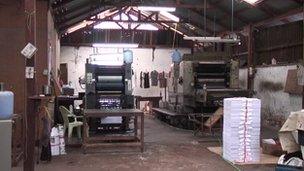My Business: Running a newspaper in Burma
- Published
Thaung Su Nyein, chief executive officer of Information Matrix: "Burma used to censor the word internet"
What makes an entrepreneur? The BBC's Ko Ko Aung spoke to Thaung Su Nyein about his experience running a media business in an environment where access to information has historically been restricted.
When Thaung Su Nyein started media company Information Matrix in 2002, he only had initial capital of $5,000 (£3,200; 3,800 euros) pulled together from his savings, coupled with a contribution from his parents.
Now it is a multi-million dollar business in Burma's (also known as Myanmar) burgeoning news and media sector.
The company's flagship printed news publication, 7Day Weekly, has one of the highest circulations of news journals in the country.
As the son of Win Aung, the late foreign minister, Thaung Su Nyein moved around and studied abroad as a young man.
By the time he moved back to Burma and established his company, censorship was notoriously strict.
But he saw an opportunity in the demand for content from an information-starved public.
And he took a huge risk working under the watchful eyes of authorities.

Thaung Su Nyein says that the newspaper industry is still in its nascent stage
"When I started my first publication, the very word 'internet' was censored. We couldn't print any article that mentioned the word 'internet'. Instead we could mention words like website, online, html, e-commerce or other things," he said.
He even had to shut down a cybercafe that he had opened in Rangoon in the early days of his business endeavour.
Restrictions into opportunities
Starting with an IT magazine, Information Matrix was able to expand to a number of other publications within the boundaries of the regime, including a celebrity and lifestyle magazine and, later on, a news periodical - the 7Day Weekly.
The printed newspaper industry may be in decline elsewhere in the world, but in Burma, Thaung Su Nyein finds that it is a growing market.
So he was not at all reluctant to launch a daily newspaper - the 7Day Daily - when the new government started to issue licences in April.
However, all privately owned daily newspapers in the market have been losing money since they began to circulate in April, mainly because of logistical problems in the country and lack of purchasing power by ordinary people.
Thaung Su Nyein estimates his daily losses - which he calls "investment costs" - to be in the range of up to five million kyats ($10,000; £6,500; 7,600 euro) a day for each paper in circulation. He says these losses are mitigated by the income from other publications in his stable.
Changing market trends?
Unlike the time when Thaung Su Nyein started out a decade ago, he says media censorship has now largely been removed by the government.
Authorities also have plans in place to expand access to the internet and telecommunications for the wider public.

The 7Day Daily Newspaper is folded by hand once it comes out of the printing press
However, these developments do not change Thaung Su Nyein's vision. For him, the internet infrastructure, electronic communications and electricity supply are all still quite weak - meaning that mobile newspapers or tablet-based newspaper reading apps are not going to replace his "premiere product" for the next few years.
At the same time, changing market trends are not a problem: "Ultimately, we are a news media organisation, not a print media organisation, so when the time comes to make a shift, we're going to be ready for the digital age or whatever other media comes up."
- Published23 May 2012
- Published15 February 2012
- Published16 May 2012
- Published9 May 2012
- Published2 May 2012
- Published1 February 2012
- Published8 February 2012
- Published17 January 2012
- Published7 December 2011
- Published24 January 2012